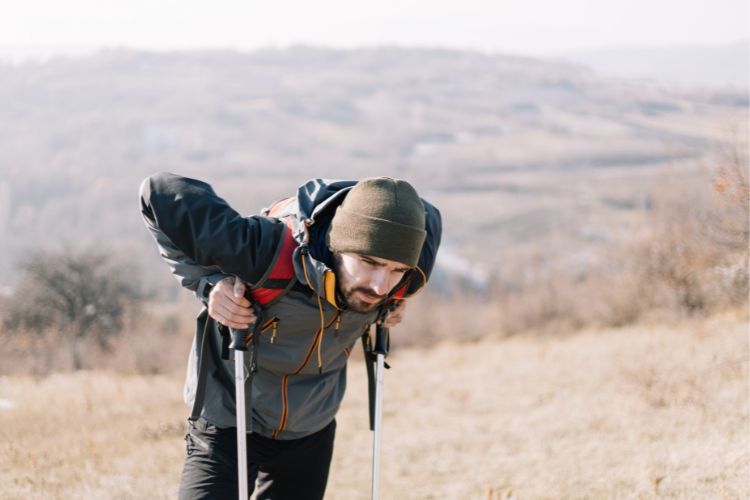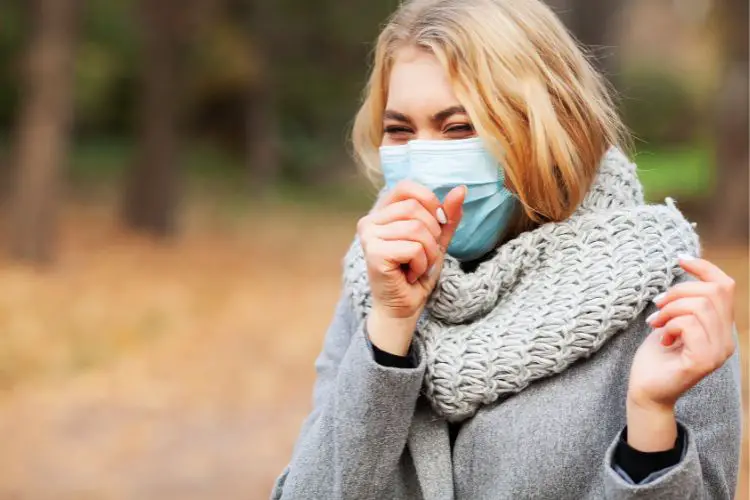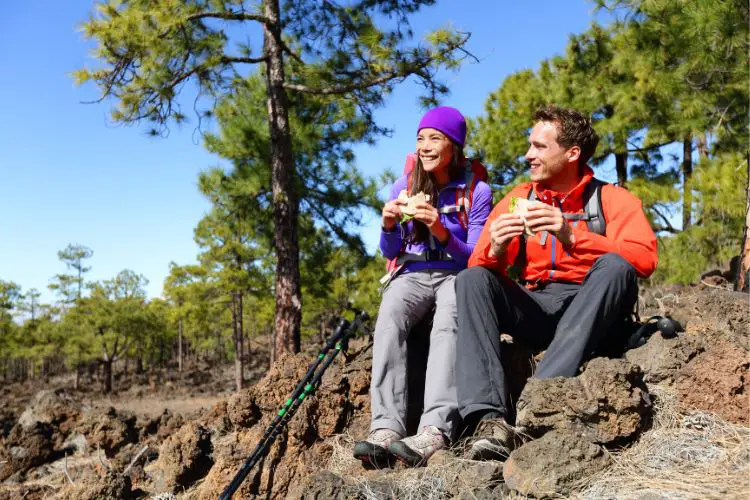Hiking enthusiasts often find it challenging to resist the call of the wilderness, even when under the weather.
The desire to explore the great outdoors doesn’t always align with our health, and the question arises: Can I go hiking with a cold?
While the temptation to hit the trails is understandable, it’s essential to consider your health and the well-being of others.
In this article, we’ll explore the factors to contemplate when deciding whether or not to venture into nature with a cold.
Contents
The Nature of a Cold

Before we dive into the hiking aspect, let’s briefly understand what a cold is. A common cold is typically a viral infection that affects your upper respiratory system.
Common symptoms include a runny or stuffy nose, sore throat, cough, sneezing, fatigue, and sometimes a mild fever.
While colds are generally not serious, they can make you feel quite miserable for a few days.
Factors to Consider when Hiking with a Cold
When deciding whether to embark on a hiking adventure with a cold, it’s essential to take several crucial factors into account. Let’s see what they are:
1. Physical Exertion
Hiking involves physical effort, and trekking while under the weather can be physically taxing.

Cold symptoms often include weakness and fatigue, which can make it challenging to enjoy the hike fully.
2. Risk of Dehydration
Hiking often leads to increased fluid loss through sweating, and when combined with the fluid loss from fever and respiratory symptoms, you risk dehydration.
Dehydration can exacerbate your symptoms and prolong your recovery.
3. Impact on Symptoms

Hiking in cold, dry air or at higher altitudes can worsen common cold symptoms like congestion and coughing.
The stress of hiking might even lead to complications such as bronchitis or sinusitis.
4. Safety Concerns
When you’re not feeling well, your judgment and reaction time may be impaired. This can be hazardous when navigating challenging terrain or making crucial decisions on the trail.
Ensuring safety remains a foremost concern during any hiking endeavor.
5. Spreading the Infection

If you’re hiking with others, you risk infecting them with your cold.
This is especially concerning if a fellow hiker has a compromised immune system, is elderly, or is more susceptible to illness.
The Potential Benefits of Hiking with a Cold
Surprisingly, some believe that hiking can provide certain advantages when you have a cold. Let’s see how you can benefit from a hiking for your illness:
1. Fresh Air and Natural Healing

Being outdoors exposes you to fresh air, potentially helping to clear nasal passages and reduce stress. Hiking is proved to improve your mental health, you can learn more here.
2. Physical Activity as Immune Support
Engaging in a moderate hike can stimulate your body’s immune response.
Increased circulation and the release of mood-boosting endorphins might just give your immune system the edge it needs to combat the cold virus.
3. Elevating Your Mood

A change of environment and the achievement of completing a hike, even a short one, can uplift your spirits.
The psychological benefits of a scenic trek can help reduce stress and enhance your overall well-being.
4. Hydration and Nutrition Focus

Hiking often prompts better hydration and nutrition awareness.
You’ll find yourself sipping water and munching on nutritious snacks to refuel, aiding your recovery by replenishing lost fluids and essential nutrients.
Note that:
Abovell, remember that moderation is key. Overexerting yourself on strenuous hikes can backfire, potentially prolonging your illness.
Therefore, if you decide to explore the trails with a cold, opt for shorter, more manageable routes, all while remaining vigilant to your body’s signals.
When to Avoid Hiking with a Cold
While we’ve explored the potential benefits and precautions of hiking with a cold, it’s crucial to recognize that there are situations when it’s better to abstain from hitting the trails:
1. Severe Cold Symptoms

If your cold symptoms are severe, such as a high fever, extreme fatigue, chest congestion, or severe coughing, it’s generally best to prioritize rest and recovery.
Hiking in such conditions can worsen your illness and pose risks to your health.
2. Medications and Treatments:

If you’re taking specific medications or undergoing treatments for your cold, it’s essential to follow your healthcare provider’s recommendations.
Some medications may interact with physical activity or require you to avoid sunlight and exposure to outdoor elements.
3. Compromised Immune System
If you have a compromised immune system due to an underlying medical condition or medication, it’s advisable to consult your healthcare provider before hiking with a cold.
You may be at greater risk of complications, and your doctor can provide tailored guidance.
4. Contagious Stage
Colds are contagious, primarily in the early days when symptoms are most acute.
To protect the health of others, consider postponing your hike until you’re no longer contagious to prevent spreading the virus to fellow hikers.
5. Medical Advice

If your healthcare provider advises against physical activity or hiking while you have a cold, it’s essential to heed their guidance.
They have the expertise to assess your specific situation and provide recommendations tailored to your health needs.
Related Questions
Is fresh air good for a cold?

Yes, fresh air can be beneficial when you have a cold. It can help clear nasal passages and provide a mental boost.
Short walks or spending time outdoors in moderation can offer relief from indoor congestion, but it’s essential not to overexert yourself and to dress warmly to avoid further discomfort.
Is it bad to hike with a sore throat?
Hiking with a sore throat is generally not advisable.
A sore throat could be a sign of an underlying infection, and hiking might worsen your symptoms, lead to dehydration, or expose you to potentially harsh environmental conditions.
Rest and stay hydrated to aid your recovery, and consider postponing your hike until you’ve fully recovered to avoid potential complications.
Should I hike if I have a cough?

Hiking with a cough is usually discouraged.
Coughing can indicate underlying respiratory issues, and physical exertion during a hike may exacerbate symptoms and lead to fatigue.
It’s advisable to prioritize rest, stay hydrated, and consult a healthcare professional to determine the cause of your cough and the best course of action for recovery.
Your health should be the primary concern when deciding whether or not to hike with a cough.
To Recap
While hiking with a cold can have potential benefits under certain circumstances, there are instances when it’s wiser to prioritize your health and postpone your outdoor adventure.
Remember that the decision ultimately rests on the severity of your symptoms, any underlying medical conditions, and the advice of your healthcare provider.
Safety and well-being should always be the top priorities in making this decision.

